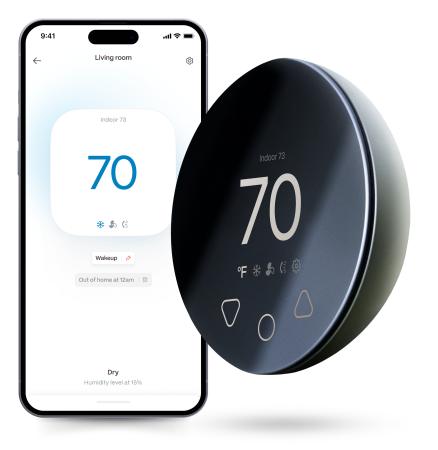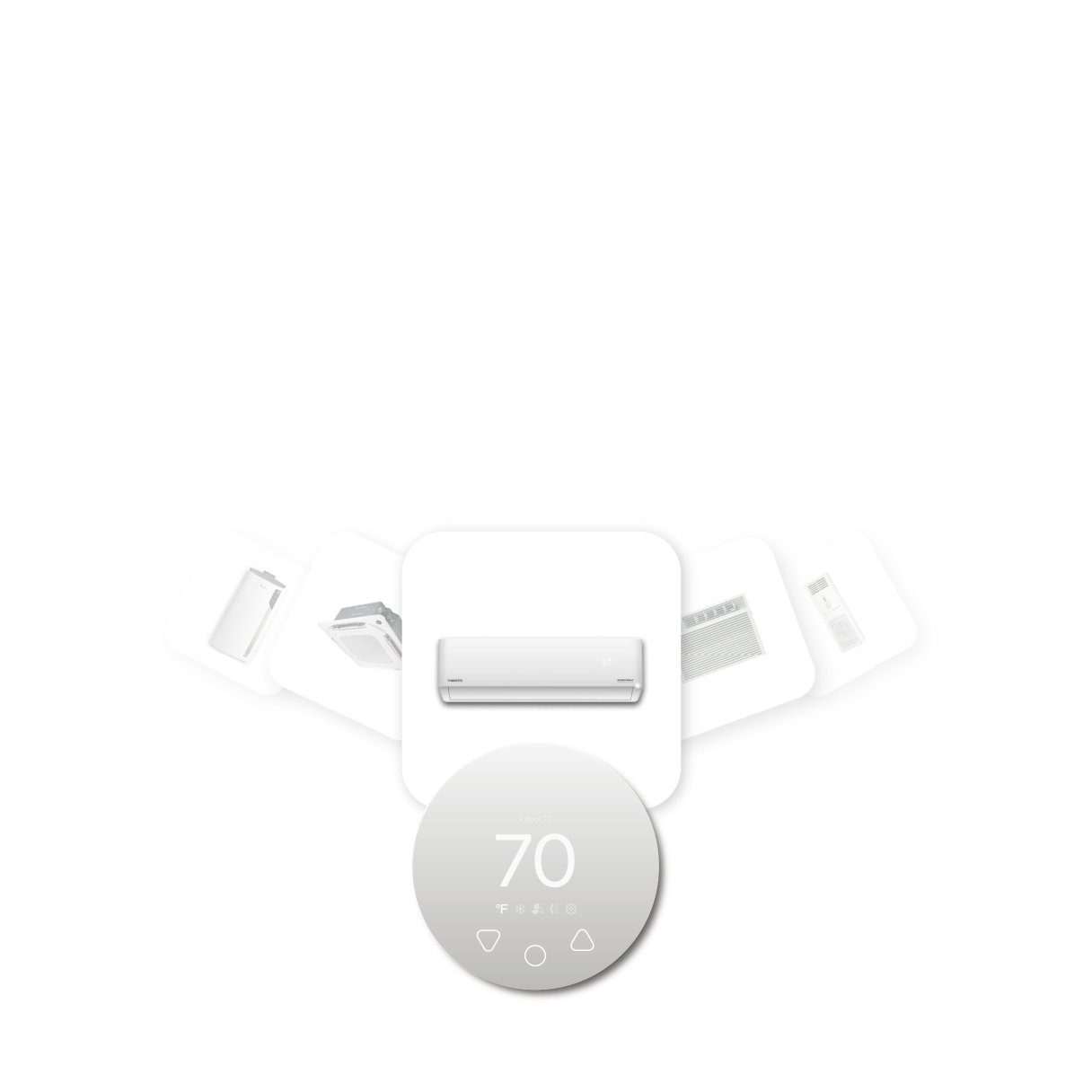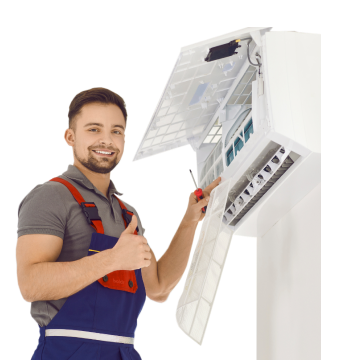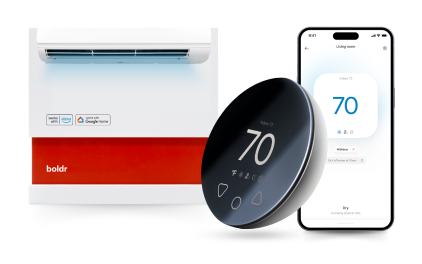
A well-functioning mini-split air conditioning system is essential for keeping your home comfortable, especially during warmer months. If your mini-split is not cooling efficiently, it could be due to low refrigerant levels. Recharging a mini-split system might sound like a complex process, but with the right steps and tools, it’s manageable.
This guide walks you through the process, along with how smart thermostats, like Klima, can enhance your mini-split system’s efficiency and warn you of any mini-split malfunctions with smart technology.
Step 1: Safety First
Before starting any work on your mini-split A/C system, prioritize safety:
1. Turn off your mini-split’s power to avoid electrical accidents.
2. Wear protective gear such as gloves, safety goggles, and protectiv
Step 2: Determine Refrigerant Type
Identify the refrigerant type your system uses. Most modern mini-split systems use R-410A, while older mini-split models may require R-22.
The refrigerant type is usually indicated on the mini-split system’s nameplate.
Using the wrong refrigerant can damage your ductless A/C and violate environmental regulations.
Step 3: Check for Leaks
Adding refrigerant to a leaking mini-split is ineffective and wasteful. Inspect your mini-split for visible oil or refrigerant stains, particularly around refrigerant lines or connections.
Use leak detection tools if necessary. Address any leaks before proceeding.
Step 4: Gather Necessary Tools
Ensure you have the following equipment:
1. Refrigerant cylinders
2. Charging hoses and manifold gauge set
3. Screwdrivers and wrenches
4. Leak detection tools
5. Safety gear
Step 5: Connect the Charging Hoses
Locate the service ports on the refrigerant lines of the mini-split system. Use the manifold gauge set to connect the:
1. Blue hose to the low-pressure service port.
2. Red hose to the high-pressure service port.
3. Yellow hose to the refrigerant cylinder.
Step 6: Purge the Hoses
Purge air from the charging hoses to ensure accurate pressure readings and to prevent air from entering your mini-split. This step is critical for proper operation.
Step 7: Attach the Refrigerant Cylinder
Securely attach the refrigerant cylinder to the yellow hose of the manifold gauge set. Keep the cylinder valve closed until ready to charge the system.
Step 8: Open the Valves
Gradually open the valves on both the low-pressure and high-pressure sides of the gauge set to allow refrigerant flow. Monitor pressure readings closely.
Step 9: Monitor and Adjust
As you charge the system, compare the pressure readings on the gauges to the manufacturer’s specifications for your mini-split model.
Be careful not to overcharge, as this can harm the system’s performance.
Step 10: Close Valves and Disconnect
Once the correct pressure levels are achieved for your mini-split, close the manifold gauge valves and disconnect the hoses.
Step 11: Test the System
Turn on your mini-split A/C and observe its performance. Check that the air from the vents is cool and the system operates efficiently.
Monitor for any irregularities that may occur when your mini-split is operating.
Step 12: Document and Inspect
Record the amount of refrigerant added, pressure levels, and other relevant details for future reference. If the system continues to underperform, consult a professional HVAC technician.
Using Smart Thermostats Like Klima to Enhance Mini-Split Systems
To keep your mini-split air conditioning system running efficiently and ensure long-term reliability, incorporating smart thermostats can make all the difference.
Klima is a smart thermostat designed for all ductless A/C brands, including Fujitsu, Mitsubishi, Daikin and Toshiba mini-split’s.
With Klima, you can track your mini-split’s performance in real-time. Klima alerts you to potential issues, such as decreased efficiency or mechanical problems, through the Boldr Energy app before they escalate.
What is Klima?
Klima is a smart thermostat for ductless A/C systems that pairs with your mini-split to provide a range of smart features and smart home compatibility through the Boldr Energy app.
Physical controls are included for added convenience, so you can control your mini-split from your phone or directly on the device.
Klima - Smart Home Thermostat for Mini-splits, Air Conditioners and Heatpumps
Compatible with all brands of ACs and Mini-Splits Automate Climate Management Control remotely Reduce Energy Consumption Monitor bills in realtime
Try Now
Other Key Features of Klima
1. Cost Monitoring and Energy Efficiency
Klima helps you track your mini-split’s energy usage in real time, providing accurate bill predictions.
With Klima’s cost monitoring feature, you can reduce costs by up to 30%.
2. Remote Access Anytime, Anywhere
Control your mini-split system remotely via the Boldr Energy app.
Adjust temperatures, turn the system on or off, and create a comfortable environment from your smartphone.
3. Smart Scheduling
Customize your mini-split’s temperature schedules with Klima’s smart scheduling feature.
Save up to 30% on your energy bills while optimising comfort.
4. Location-Sensing Technology
Klima’s geofencing feature detects when the last person leaves the house.
It automatically turns off your mini-split, preventing energy waste, and reactivates it when someone returns.
5. Open Window Detection
If a window is left open, Klima detects this and automatically shuts off your mini-split to prevent unnecessary energy usage.
Smart Home Integration
Klima integrates with popular smart home ecosystems like Apple HomeKit, Google Home, and Amazon Alexa.
Control your mini-split with voice commands, such as saying, “Alexa, set the living room to 72 degrees.”
Conclusion
Maintaining a well-functioning mini-split air conditioning system is essential for a comfortable home, and recharging your system when needed is a critical part of that upkeep. By following the step-by-step process outlined in this guide, you can confidently recharge your system, ensuring it operates efficiently and effectively.
Regular maintenance not only prevents cooling issues but also extends the lifespan of your unit, saving you money in the long run.
Adding smart technology like Klima further enhances your mini-split system by providing real-time performance monitoring, energy-saving features, and intelligent controls.
However, Klima is just one piece of the puzzle. Proper care - such as inspecting for refrigerant leaks, using the correct refrigerant type, and keeping your unit clean - plays an equally important role in keeping your system running smoothly.


















